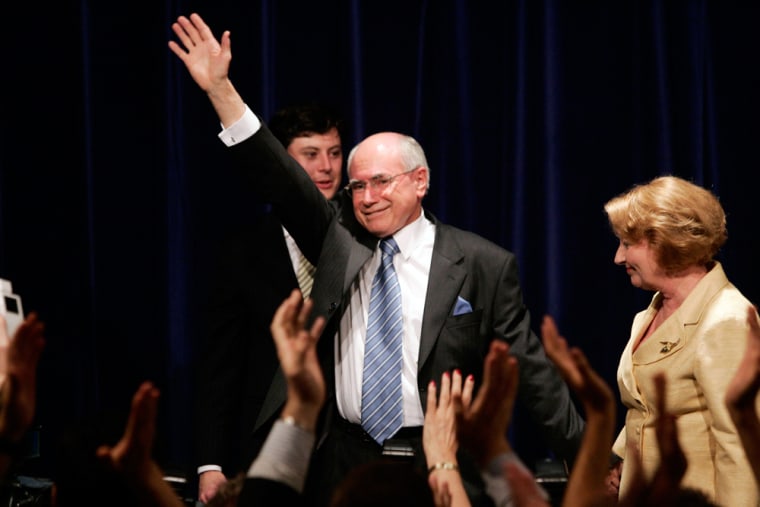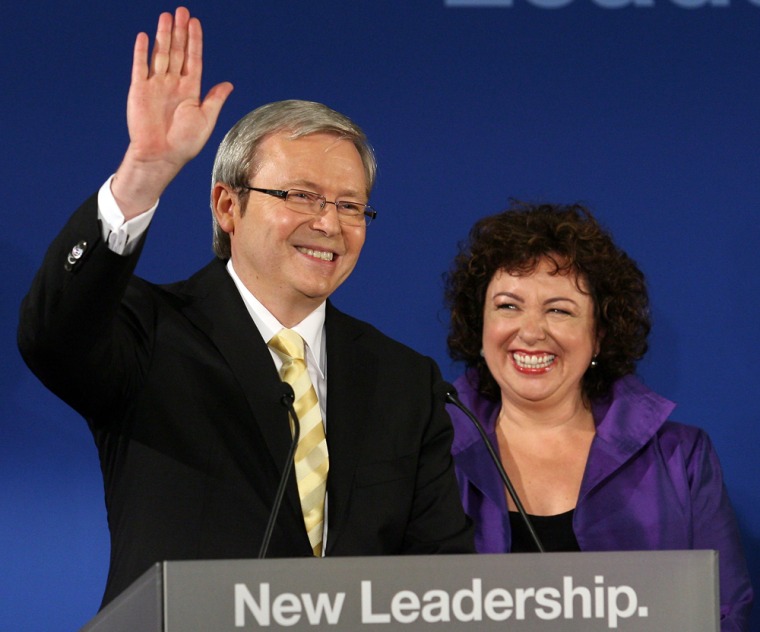Australians entered a new political era Sunday after electing a Chinese-speaking former diplomat as their first new prime minister in more than a decade, and handing four-term leader John Howard a humiliating loss.
Labor Party leader Kevin Rudd's emphatic victory swings Australia toward the political left after almost 12 years of conservative rule, and marks a generational shift that will result in a greater focus on issues such as global warming.
Saturday's elections brought a sharp and mortifying end to Howard's career, and he looked likely to suffer the further embarrassment of losing his own seat in Parliament — only the second sitting prime minister in 106 years of federal government to suffer that fate.
Turmoil on the right
The outgoing government fell into turmoil almost immediately, with Howard's nominated successor, outgoing Treasurer Peter Costello, announcing Sunday he would not accept the post of opposition leader.
The surprise announcement opens the possibility of a bruising fight for the leadership, with outgoing Foreign Minister Alexander Downer and former Environment Minister Malcolm Turnbull likely candidates.
Howard, who reshaped Australia's image abroad with his unwavering support for U.S. President Bush's war on terrorism and in Iraq, had dominated Australia's political scene for years but failed to read the signs that voters had grown tired of his rule.
Rudd has promised to pull Australia's 550 combat troops from Iraq in a phased withdrawal, and to quickly sign the Kyoto Protocol on limiting greenhouse gas emissions — two of Labor's main policy differences with Howard's government.
But the bulk of Australia's foreign, trade and economic policies were not expected to change much.
"The Australian people have decided that we as a nation will move forward," Rudd said in a victory speech late Saturday. "To plan for the future, to prepare for the future, to embrace the future and together as Australians to unite and write a new page in our nation's history."
‘Economic conservative’
Rudd has pledged to govern as an "economic conservative," while pouring money into schools and universities. He will curtail sweeping industrial reforms Howard introduced that were widely perceived to hand bosses too much power.

Rudd attended a church service with his family on Sunday, and was then due to hold a series of meetings with senior advisers. He is expected to be formally sworn in as prime minister later this week.
Howard took his customary early-morning walk along the Sydney Harbor foreshore, but did not speak to a media throng waiting for him.
Few in Rudd's team have any federal government experience. It includes a former rock star — one-time Midnight Oil singer Peter Garrett — a former television presenter and a number of former union officials.
Rudd has more experience in foreign policy than any other area of government, and can be expected to adopt a nuanced, non-confrontational approach, experts said.
With 75 percent of the more than 13.5 million ballots counted, Labor had won more than 53 percent and had secured at least 83 places in Parliament's 150-seat lower house, official Australian Electoral Commission results showed Sunday.
That was at least 23 seats more than the center-left Labor Party won at the last election in 2004 — representing a huge swing in Australian political terms.
Howard's center-right Liberal-National coalition had 46.6 percent of the vote, and 47 parliamentary seats. Howard's Sydney suburban district of Bennelong hung in the balance, with the final outcome to be decided by postal votes to be counted in the next few days.
Howard, 68, had stayed on to fight for a fifth term in office despite months of perilous opinion poll numbers and the urging of some colleagues to quit while he was ahead.
Howard accepts blame
He took the blame for the drubbing handed to his government.
"I accept full responsibility for the Liberal Party campaign, and I therefore accept full responsibility for the coalition's defeat in this election campaign," Howard said in his concession speech.
Rudd, 50, had urged voters to support him because Howard was out of touch with modern Australia and ill-equipped to deal with new-age issues such as climate change and high-speed Internet.
Howard campaigned on his economic management, arguing that his government was mostly responsible for 17 years of unbroken economic growth, fueled by China's and India's hunger for Australian coal and other minerals. He also contended that Rudd could not be trusted to maintain prosperous times.
Bush and British Prime Minister Gordon Brown were among world leaders who congratulated Rudd and Labor on the victory.
